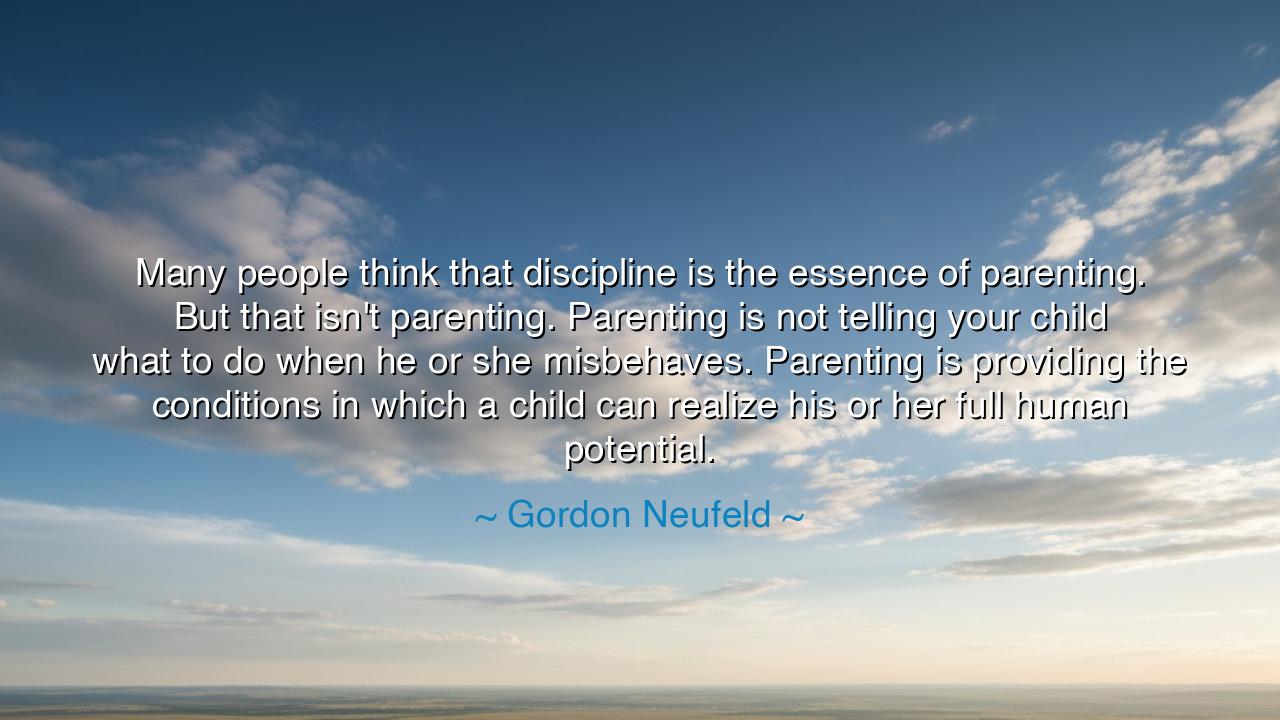
Many people think that discipline is the essence of parenting.
Many people think that discipline is the essence of parenting. But that isn't parenting. Parenting is not telling your child what to do when he or she misbehaves. Parenting is providing the conditions in which a child can realize his or her full human potential.






Gordon Neufeld, the wise Canadian psychologist, once spoke words that cut through the noise of modern theories: “Many people think that discipline is the essence of parenting. But that isn’t parenting. Parenting is not telling your child what to do when he or she misbehaves. Parenting is providing the conditions in which a child can realize his or her full human potential.” These words are like a torch held high in the night, guiding parents away from the narrow path of correction alone and toward the greater journey of nurturing life itself.
Too often, the world confuses discipline with parenthood, as if the role of the father or mother were merely to correct, to scold, to mold by force. Neufeld reminds us that this is but a fragment of the truth. To parent is not simply to restrain misbehavior, but to cultivate the soil in which the child’s spirit may flourish. Just as a gardener does not yell at a seed to grow, but instead ensures the right light, water, and soil, so too must a parent provide the environment where growth is natural, steady, and strong.
History gives us many examples of this truth. Consider Maria Montessori, whose philosophy of education reshaped the world. She did not see children as clay to be hammered into shape, but as beings with hidden powers waiting to be drawn forth. By creating classrooms filled with beauty, order, and freedom, she allowed children to awaken their own love of learning. Here we see Neufeld’s vision alive: the child guided not by punishment, but by the unseen hand of thoughtful preparation, the conditions of growth.
Neufeld’s words also remind us that misbehavior is not the heart of the child, but often a cry of unmet need, an expression of confusion or longing. To focus only on correction is to treat the symptom while ignoring the cause. But to provide safe attachment, consistent love, and opportunities for exploration—that is to touch the root. In doing so, the child learns not only to behave, but to become, to unfold into the fullness of their humanity.
The essence of parenting, then, is less about control and more about presence. It is about building trust, about offering stability when the world shakes, about showing love even when the child resists. The parent who understands this becomes not a warden, but a guide, a mentor, a safe harbor. And from such a harbor, the child learns to sail boldly into life’s seas.
The lesson for us is clear: do not make discipline your idol. Correct when you must, but do not confuse correction with creation. Your true task is to create an atmosphere where your child can breathe, think, love, and grow. Ask yourself not only, “How do I stop this behavior?” but also, “What conditions will help this child flourish?” Love, patience, consistency, and respect are the four pillars upon which such conditions are built.
Therefore, let every parent who hears this teaching remember: you are not only shaping a child’s outward conduct, but their inner being. The world has no shortage of people who were silenced into obedience but never nourished into greatness. Be the parent who plants deeply, waters faithfully, and trusts the process of growth. For in the end, your legacy will not be the punishments you gave, but the human soul you helped rise to its fullest stature.
Thus, Neufeld’s wisdom shines like an eternal reminder: parenting is not the art of control, but the art of cultivation. And those who learn this truth will not only raise children who behave, but raise souls who shine, carrying forth light into generations yet to come.






AAdministratorAdministrator
Welcome, honored guests. Please leave a comment, we will respond soon